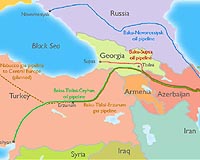October 17th, 2008
Via Energy Daily, a report that oil from Kazakhstan’s Tengiz field will be delivered by tankers across the Caspian Sea to the BP-led consortium’s Sangachal Terminal on Azerbaijan’s Absheron Peninsula for pumping into the1,094-mile, $3.6 billion Baku-Tbilisi-Ceyhan (BTC) pipeline for transmission to Ceyhan. As the article notes:
“…The August Russian-Georgian military conflict highlighted the vulnerability of Western-funded export routes through the Caucasus region for Caspian oil.
….If the armed confrontation made Western investors nervous about future Western-running pipeline projects, Kazakhstan has drawn its own conclusions about the need to diversify export routes. In a gesture of support that will gladden both Baku and BP executives, Astana later this month will begin pumping Kazakh oil from its massive Tengiz field into BTC, according to BP-Azerbaijan executives
…The commitment is more impressive for its diplomatic than economic value, as it works out to a little less than 98,000 barrels per day, or slightly less than 10 percent of BTC’s 1 million bpd throughput capacity. What is critical is that Kazakhstan has made a gesture of good will toward the future of the BTC pipeline. After the Aug. 5 BTC pipeline explosion at Yurtbasi village, valves 29 and 31 were closed as officials waited for the oil contained in the 4-mile segment to burn out and BTC operator BP declared force majeure. When BTC resumed operations 20 days later, Azerbaijan had been blocked from shipping approximately 17 million barrels of crude, while the U.S. Department of Energy estimated that Azerbaijan’s final cost for the lost shipments was more than $1 billion.
If Astana will be paying transit fees to Azerbaijan, Georgia and Turkey for using BTC, it will manage to keep all of its tanker revenues, as in 2002 Kazakhstan’s state-owned oil and gas company KazMunaiGas subsidiary Kazmortransflot and Mobilex in 2002 signed a contract, largely underwritten by the European Bank for Reconstruction and Development, with Russia’s Vympel Ship Design Co. to construct three Caspian tankers. In 2005 Kazmortransflot took delivery of its first tanker, the $18.75 million Astana, which now plies the Aktau-Baku and Aktau-Makhachkala routes, carrying oil from Kazakhstan’s Tengiz and Buzachi fields, making seven to eight voyages per month, hauling a million tons of oil annually. Since its launch, the Astana has been joined by sister ships Aktay, Abaj, Kazakhstan and Almaty….”
Focusing primarily on The New Seven Sisters - the largely state owned petroleum companies from the emerging world that have become key players in the oil & gas industry as identified by Carola Hoyos, Chief Energy Correspondent for The Financial Times - but spanning other nascent opportunities around the globe that may hold potential in the years ahead, Wildcats & Black Sheep is a place for the adventurous to contemplate & evaluate the emerging markets of tomorrow.

